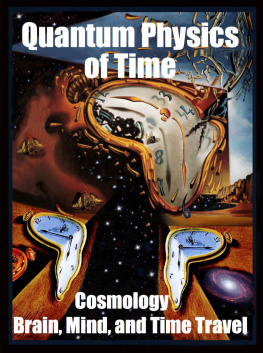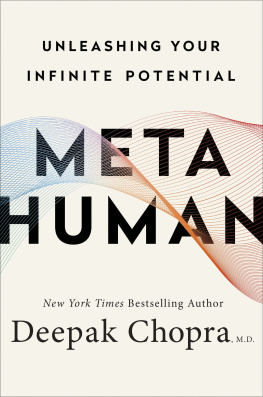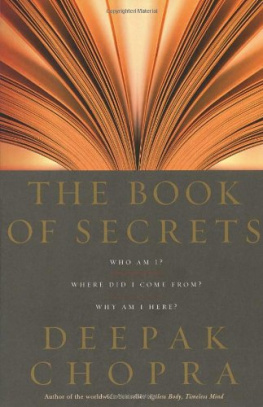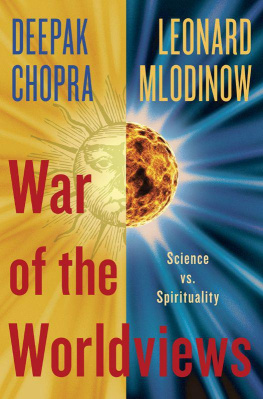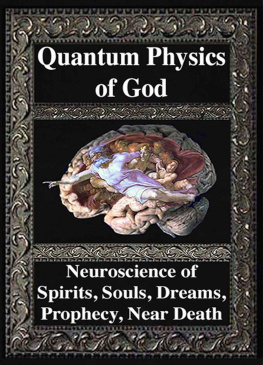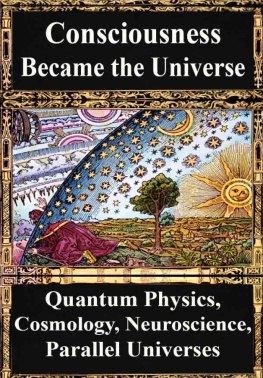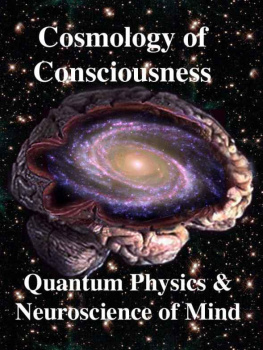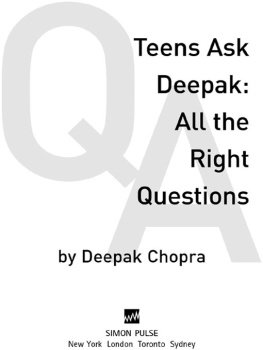Deepak Chopra - Quantum Physics of Time:: Cosmology, Brain, Mind, and Time Travel
Here you can read online Deepak Chopra - Quantum Physics of Time:: Cosmology, Brain, Mind, and Time Travel full text of the book (entire story) in english for free. Download pdf and epub, get meaning, cover and reviews about this ebook. year: 2015, publisher: Cosmology Science Publishers, genre: Religion. Description of the work, (preface) as well as reviews are available. Best literature library LitArk.com created for fans of good reading and offers a wide selection of genres:
Romance novel
Science fiction
Adventure
Detective
Science
History
Home and family
Prose
Art
Politics
Computer
Non-fiction
Religion
Business
Children
Humor
Choose a favorite category and find really read worthwhile books. Enjoy immersion in the world of imagination, feel the emotions of the characters or learn something new for yourself, make an fascinating discovery.
- Book:Quantum Physics of Time:: Cosmology, Brain, Mind, and Time Travel
- Author:
- Publisher:Cosmology Science Publishers
- Genre:
- Year:2015
- Rating:4 / 5
- Favourites:Add to favourites
- Your mark:
- 80
- 1
- 2
- 3
- 4
- 5
Quantum Physics of Time:: Cosmology, Brain, Mind, and Time Travel: summary, description and annotation
We offer to read an annotation, description, summary or preface (depends on what the author of the book "Quantum Physics of Time:: Cosmology, Brain, Mind, and Time Travel" wrote himself). If you haven't found the necessary information about the book — write in the comments, we will try to find it.
Quantum Physics of Time:: Cosmology, Brain, Mind, and Time Travel — read online for free the complete book (whole text) full work
Below is the text of the book, divided by pages. System saving the place of the last page read, allows you to conveniently read the book "Quantum Physics of Time:: Cosmology, Brain, Mind, and Time Travel" online for free, without having to search again every time where you left off. Put a bookmark, and you can go to the page where you finished reading at any time.
Font size:
Interval:
Bookmark:

Quantum Physics of Time
Cosmology, Brain, Mind, and
Time Travel
By
Deepak Chopra, Giovanni Berlucchi, Brandon Carter, Menas C. Kafatos, Subhash Kak, Chris King, John Smythies, Andrea Nani, Andrea E. Cavanna, Shaun Gallagher, Juan C. Gonzlez, Steven Bodovitz, Franz Klaus Jansen, Michael C. Corballis, Liliann Manning, John T. Furey, Vincent J. Fortunato, Francois Martin, Federico Carminati, Giuliana Carminati, Lan Tao, R. G. Joseph
From an Edition Edited by Deepak Chopra and Menas C. Kafatos
Cosmology Science Publishers, Cambridge, 2015
Copyright 2015
Published by: Cosmology Science Publishers, Cambridge, MA
Cover Design: R. Joseph, Ph.D.
All rights reserved. This book is protected by copyright. No part of this book may be reproduced in any form or by any means, including photocopying, or utilized in any information storage and retrieval system without permission of the copyright owner.
The publisher has sought to obtain permission from the copyright owners of all materials reproduced. If any copyright owner has been overlooked please contact: Cosmology Science Publishers at Editor@Cosmology.com, so that permission can be formally obtained.
Key Words: Quantum Physics, Relativity, Consciousness, Neuroscience, Brain, Mind, Time Travel, Mental Time Travel,
Contents
*********
****
********
I: Time, Reality, Temporal Non-Locality Vendanta, Upanishads and Quantum Mechanics
*********
****
********
1. The Nature of Reality, the Self, Time, Space and Experience
Menas C. Kafatos and Deepak Chopra
Chapman University, Orange, CA 92866
Chopra Foundation, 2013 Costa Del Mar Road, Carlsbad, CA 92009
Abstract
In this article we address the nature of Reality, universal Consciousness and the subjective Self found in monistic systems of India, particularly in many stras of Vedanta and Kashmir aivism. These monistic systems do not consider time (or space) as primary but treat it as a derivative of consciousness. A brief summary of monisms process of manifestation of all objective existence, including time, greatly adds to the present special volume. Monism complements western science. Indian schools of monism complement Western science through intriguing parallels with modern quantum theory and the role of the observer. Moreover, qualia, the innumerable qualities of subjective experiences, play a fundamental role in both monistic and scientific descriptions of consciousness as it unfolds from its source. The conscious universe is an emerging view in science, in accord with ancient views about the primacy of consciousness at every level of reality.
Keywords: Consciousness, Self, time, Reality, experience, quantum mechanics, qualia
Introduction
Several of the topics explored in this text, are at the very center of what constitutes subjective experience of time. However, the problems of experience, and, ultimately, of conscious self-awareness are not addressed by modern science as science deals with the nature of the objective world, with interactions between objects. Although attempts are made in a variety of fields, including psychology, neuroscience and even philosophy of science to address the issue of experience, the basic challenge remains that by its nature, science can only talk about objective reality, while self-awareness ultimately concerns itself with subjective experience and existence. Yet, Indian perennial philosophies have covered the issue of consciousness extensively and provide the means to merge intellectual understanding with personal experiences that begin with everyday perceptions but extend far into the possibility of mind as a force for altering reality out there. Monistic systems attribute time (and space) as being derived from experience itself, Consciousness being fundamental. This view is profoundly different from the ontology of science, wherein consciousness is a derivate of physical processes.
This introductory article offers a summary of the nature of Reality, consisting of universal Consciousness, the Self of every being and at every level of existence. The monistic explanation of manifestation and for the emergence of time and space has sufficient rigor to complement Western science and provide insights into the particularly challenging issues of experience itself.
Perennial Monistic Systems
Perennial philosophies concern themselves with the nature of Consciousness, the relationship of the individual to the universe and the relationship of the individual to Consciousness itself. Below we will illustrate with a few selected statements some of these eternal truths and examine how they relate to experience, including how space and time themselves arise.
The non-dualistic systems originating in India, specifically Advaita Vedanta and Kashmir aivism, give us a higher view of the individual, the universe and the nature of consciousness. The underlying premise, is that the human being is a reflection of fundamental Consciousness and that in fact there is no difference between the individual and universal Consciousness. aivism and Vedanta are complete systems of teachings on the nature of ultimate reality, or the Absolute. This underlying reality is called Brahman in Vedanta and Paramaiva or Supreme iva in Kashmir aivism. Both accept Absolute undifferentiated Consciousness as the ultimate Reality, as the underlying reality of all countless objects, subjects and the processes tying them together, such as observation, sentience, understanding, dynamics, cause and effect, etc. Although agreeing on the ultimate Reality, they do differ in emphasis: Vedanta emphasizes that Brahman is the only reality and the perception of the universe as something separate from that as an illusion; while aivism accepts the universe as real, being itself, as we will see below, part of universal Consciousness. The universe is part of the whole, albeit being the physical, mental, subtle and in fact all objective experience, of the great underlying sea of Consciousness.
Advaita Vedanta
Vedanta accepts the authority of three sets of works, spanning several centuries: The Upanishads, the Brahma Stras, and, the Bhagavad Gt (Kuiken, 2006). Its basic principles are summarized in the Viveka Chudamani (Crest-Jewel of Discrimination) by Adi ankar:
a) Brahman is Reality b) The world is an illusion and, 3) The individual Self is nothing but Brahman.
ankars illusion is taken to mean the misinterpretation of experience (and not non-existent.). To see the world as independent and separate from the Self, is an illusion. To know reality is to experience the diversity of the universe (Brahman) as identical to ones Self (tman). Sutra 4 of the Isha Upanishad asks: How can the multiplicity of life delude the one who sees its unity? And the Nrsimhottaratapaniya Upanishad states: All this is tman, all this is Brahman, all this is consciousness.
The Viveka Chudamani (Crest-Jewel of Discrimination) of Adi ankar states: The tman is one, absolute, indivisible. It is pure consciousness. To imagine many forms within it is like imagining palaces in the air. Therefore, know that you are the Atman, ever-blissful, one without a second. The Aparokshnubhuti (Self-Realization) of Adi ankar states in stra 45: There exists no other material cause of this phenomenal universe except Brahman. Hence this whole universe is but Brahman and nothing else. While stra 49 states Inasmuch as all beings are born of Brahman, the supreme tman, they must be understood to be verily Brahman. In short, Vedantas ultimate teaching is that tman (individual Self of any being) is identical to Brahman.
Kashmir aivism
The ancient system, aivism and its more recent specific form as developed in Kashmir, (Dyczkowski, 1992, 1994; Singh, 1980, 2006), constitutes a body of philosophical teachings, with practical implications for everyday life. Kashmir aivism flourished in Kashmir between the 8th 12th centuries CE, and was developed and built in the tradition of Vedanta. Kashmir aivism was developed in that brief but very active period by sages such as Vamana (779 813 CE), Vasugupta (875 925 CE), Utpaladeva (disciple of Vasugupta, 900 950 CE), Kallata (also disciple of Vasugupta), Bhaskara, Somananda, the great aivite master Abhinavagupta (950 1020 CE), and Kemarja (a great disciple of Abhinavagupta). They have left us a rich, dynamic vision of the universe and our place in it.
Next pageFont size:
Interval:
Bookmark:
Similar books «Quantum Physics of Time:: Cosmology, Brain, Mind, and Time Travel»
Look at similar books to Quantum Physics of Time:: Cosmology, Brain, Mind, and Time Travel. We have selected literature similar in name and meaning in the hope of providing readers with more options to find new, interesting, not yet read works.
Discussion, reviews of the book Quantum Physics of Time:: Cosmology, Brain, Mind, and Time Travel and just readers' own opinions. Leave your comments, write what you think about the work, its meaning or the main characters. Specify what exactly you liked and what you didn't like, and why you think so.

